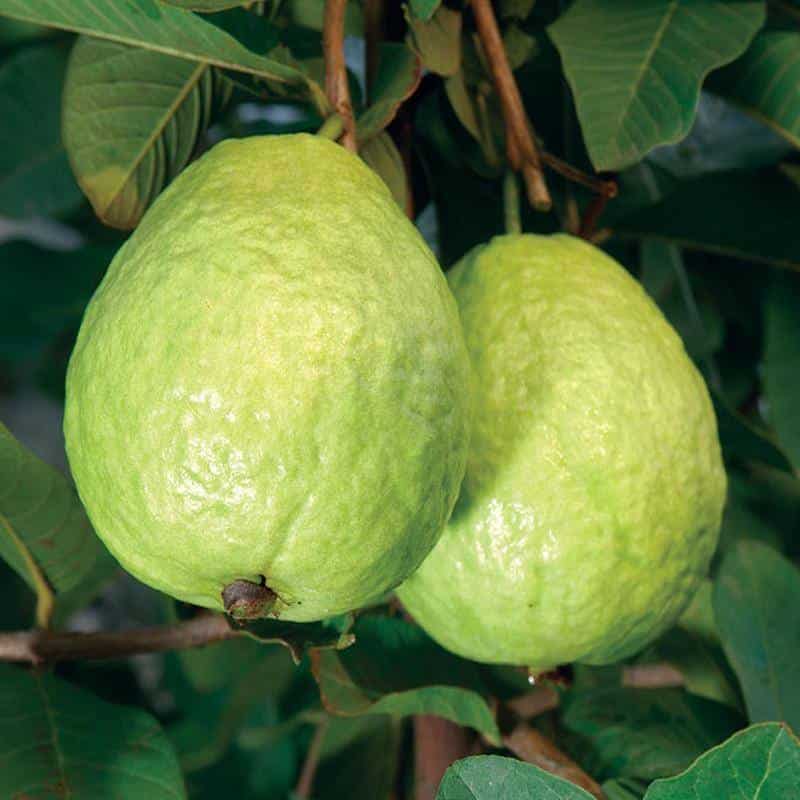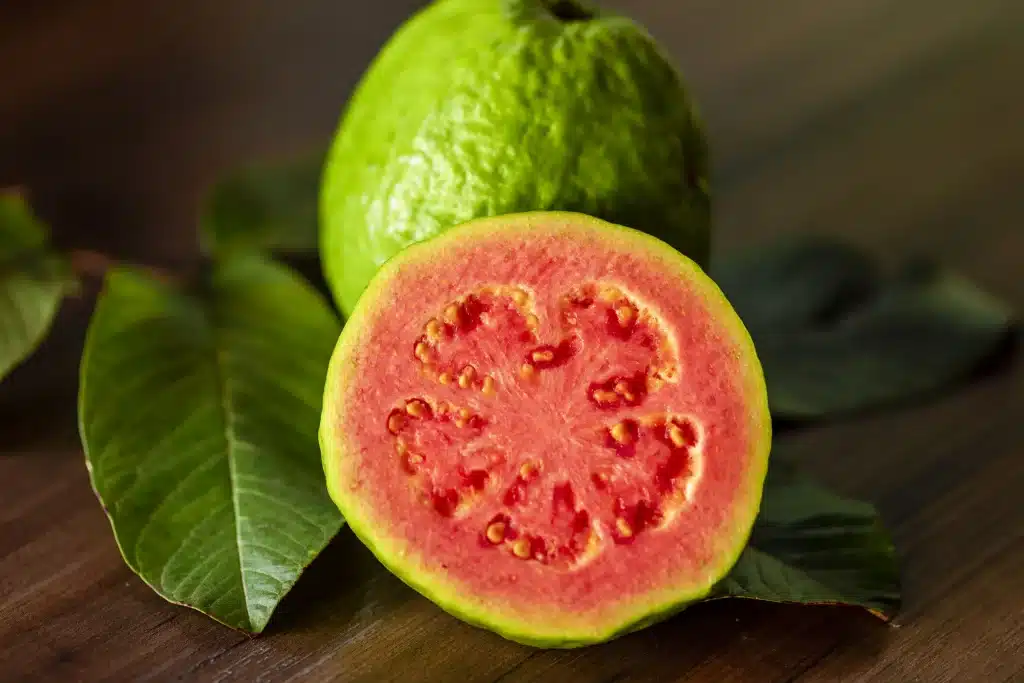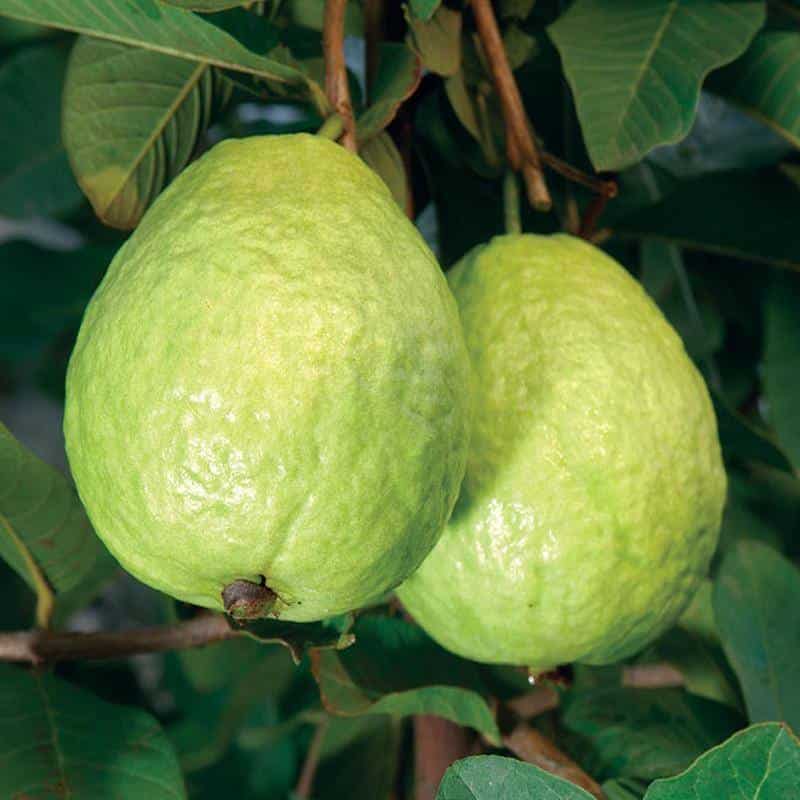Guava is a tropical fruit that is typically eaten fresh and uncooked. Here are a few ways to eat guava:
- Simply cut the fruit in half and scoop out the flesh with a spoon. You can eat the flesh as is or sprinkle it with a bit of salt or sugar to enhance the flavor.
- Slice the fruit into wedges and eat it like an apple, discarding the seeds.
- Dice the fruit and add it to salads, salsas, or smoothies for a burst of flavor.
- Make guava juice by blending the fruit and straining out the seeds. You can add sugar or honey to taste.
- Guava can also be used in a variety of culinary applications such as jams, jellies, desserts, and savory dishes.
It’s important to note that the skin of the guava is not typically eaten and should be peeled off before consuming the fruit. Guava can be eaten at different ripeness, some people prefer it to be eaten when it’s unripe (hard) and some when it’s ripe (soft).
Varieties
There are many different varieties of guava, but some of the most common ones include:
Apple guava: This variety is also known as the strawberry guava and it has a round shape and red or yellow skin. The flesh is sweet and juicy, with a strawberry-like flavor.

Pink guava: This variety has a round or oval shape and green or yellow skin that turns pink when ripe. The flesh is sweet and juicy, with a slightly tart flavor.

Yellow guava: This variety has a round shape and yellow skin. The flesh is sweet and juicy, with a slightly tart flavor.

White guava: This variety has a round shape and green or yellow skin. The flesh is white, with a mild and sweet flavor.

Pineapple guava: This variety is also known as the feijoa and it has an oval shape and green skin. The flesh is sweet and juicy, with a pineapple-like flavor.

Each variety of guava has its own distinct flavor, texture, and nutritional values. Some varieties may be sweeter, some may have higher Vitamin C content, and some may be more fragrant than others. They can also vary in size and color. They are all delicious and healthy and a great addition to a varied diet.
Nutritional Benefits
Guava is a nutrient-dense fruit that is high in vitamins, minerals, and antioxidants. Here are some of the nutritional benefits of eating guava:
- High in Vitamin C: Guava is one of the richest natural sources of vitamin C, providing more than four times the amount found in an orange. Vitamin C is an important antioxidant that helps boost the immune system and protect cells from damage.
- Good source of Fiber: Guava is a good source of dietary fiber, which can help promote healthy digestion and prevent constipation.
- Rich in antioxidants: Guava contains a variety of antioxidants, including lycopene and carotenoids, which help protect against chronic diseases such as cancer and heart disease.
- Contains Vitamin A and K: Guava contains vitamin A, which is essential for healthy vision, and vitamin K, which is important for blood clotting and bone health.
- Good source of minerals: Guava is a good source of minerals such as potassium, which helps regulate blood pressure, and magnesium, which helps maintain healthy bones.
- Low in calories: Guava is low in calories making it an ideal fruit for those who are trying to lose weight.
It’s important to note that the nutritional content of guava may vary depending on the variety, ripeness, and growing conditions. Eating a variety of fruits, including guava, as a part of a healthy diet can provide a wide range of health benefits.
Too Much Intake
While guava is a nutritious and healthy fruit, it is possible to consume too much of it. Here are a few potential side effects of consuming too much guava:
- Diarrhea: Eating too much guava can cause diarrhea due to its high fiber content.
- Stomach upset: Consuming too much guava can cause stomach upset, including gas, bloating, and constipation.
- Allergic reactions: Some people may be allergic to guava and may experience symptoms such as hives, itching, and difficulty breathing if they consume too much.
- Interference with medication: Guava leaves have high tannin content, which can interfere with the absorption of certain medications such as antibiotics and blood-thinning drugs.
- Weight gain: Guava is high in natural sugars and consuming too much of it can lead to weight gain.
It’s important to remember that moderation is key when consuming any food. Eating a balanced diet that includes a variety of fruits, vegetables, and other nutrient-dense foods is the best way to ensure that you are getting the nutrients you need without overdoing it on any one food. It’s also important to speak with a healthcare professional if you have any concerns about consuming guava or any other food.

